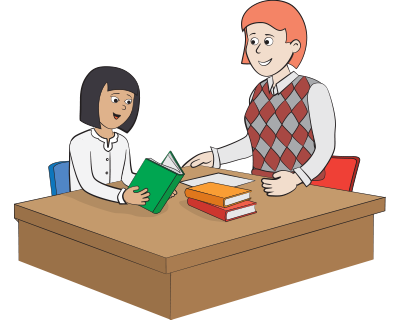Literacy Curriculum
The KinderQ™ literacy curriculum was developed by a Reading Specialist, Early Years Literacy Consultant, and certified Reading Recovery teacher who also provides each KinderQ™ teacher with continuous, extensive training in the best practices and methodologies in early literacy teaching.
This teaching expertise is needed due to the recent, dramatic increases in the literacy achievement levels children are expected to obtain by the end of Kindergarten. These levels are crucial to meet because they set the foundation upon which all their future literacy learning will be built. Research shows that children who fall behind and struggle in literacy when entering Grade One tend to continue struggling with it, and most other subject areas, throughout their entire schooling. Indeed, early reading and writing achievement has been found to be a reliable predictor of later school achievement in every other subject area. KinderQ™ ensures children reach and exceed all of the new literacy standards so they are ready for maximum success in Grade One and beyond.
Reading
KinderQ™ provides each child with an individualized reading program that equips them with a “tool kit” of essential reading skills and strategies that enable them to read books independently at ever-increasing levels of difficulty. All of the children take part in an Individual Guided Reading Session with the teacher each day in which they are expertly guided and supported in applying, practicing, and extending these tools. The sessions are carefully designed to provide children with the right balance of support and challenge so they continuously experience success and a sense of pride in their growing abilities. Skill areas include:
- Concepts about print
- Independent reading skills and strategies
- Listening comprehension skills
- Reading comprehension skills

Spelling and Phonics
The KinderQ™ spelling and phonics program incorporates different multi-sensory activities that are fun to do, and lead to quick and productive learning. All the skills are introduced in a systematic, sequential method, and they are continuously reviewed and practised so they become consolidated and mastered. Skill areas include:
- Printing uppercase and lowercase letters
- Syllables and rhyming words
- Letter/sound relationships: Consonants, vowels, digraphs
- Decoding: Sounding out words to aid in reading
- Segmenting: Stretching out words to aid in spelling
Writing Skills
Children take part in daily writing activities that are specially designed to teach them the writing conventions and strategies they need to express themselves in clear, written form. Teachers utilize their expertise to carefully guide and support each child in moving up through the different stages of their writing and spelling development (i.e., from scribbling and marking marks on paper to writing complete sentences with proper spacing, punctuation, and grammar). Children also have fun becoming “authors” of numerous books on a variety of interesting subjects.
Oral Language and Critical Thinking Skills
Children take part in daily activities and games in which they learn and practice important communication and higher order, critical thinking skills they can apply to all areas of their learning. Skill areas:
- Listening carefully to others
- Speaking clearly to others
- Analyzing and classifying information
- Relating, reflecting and retelling information
- Comparing and contrasting information
